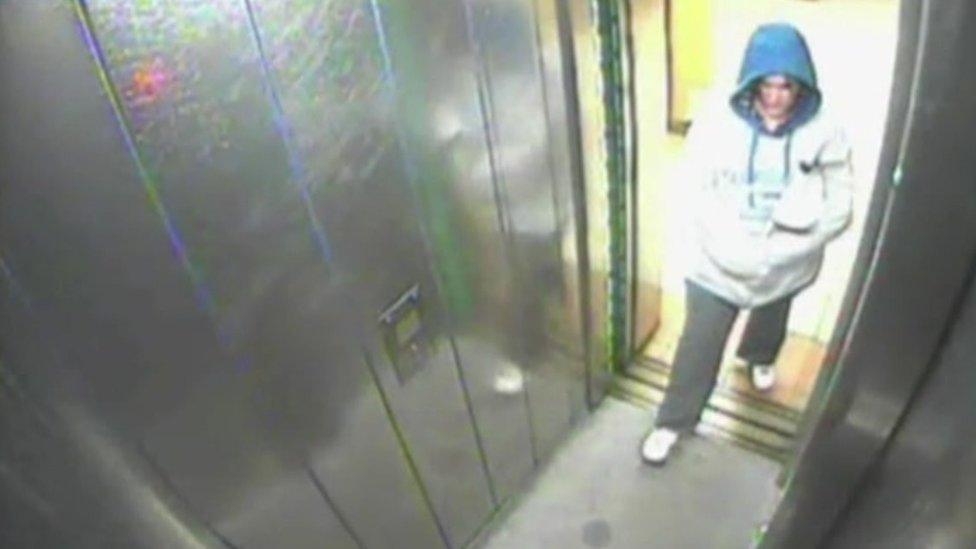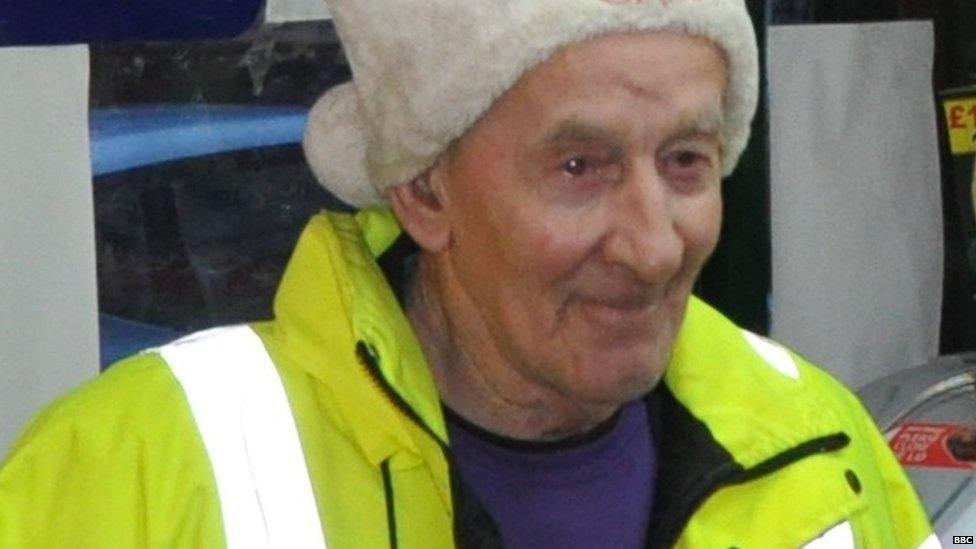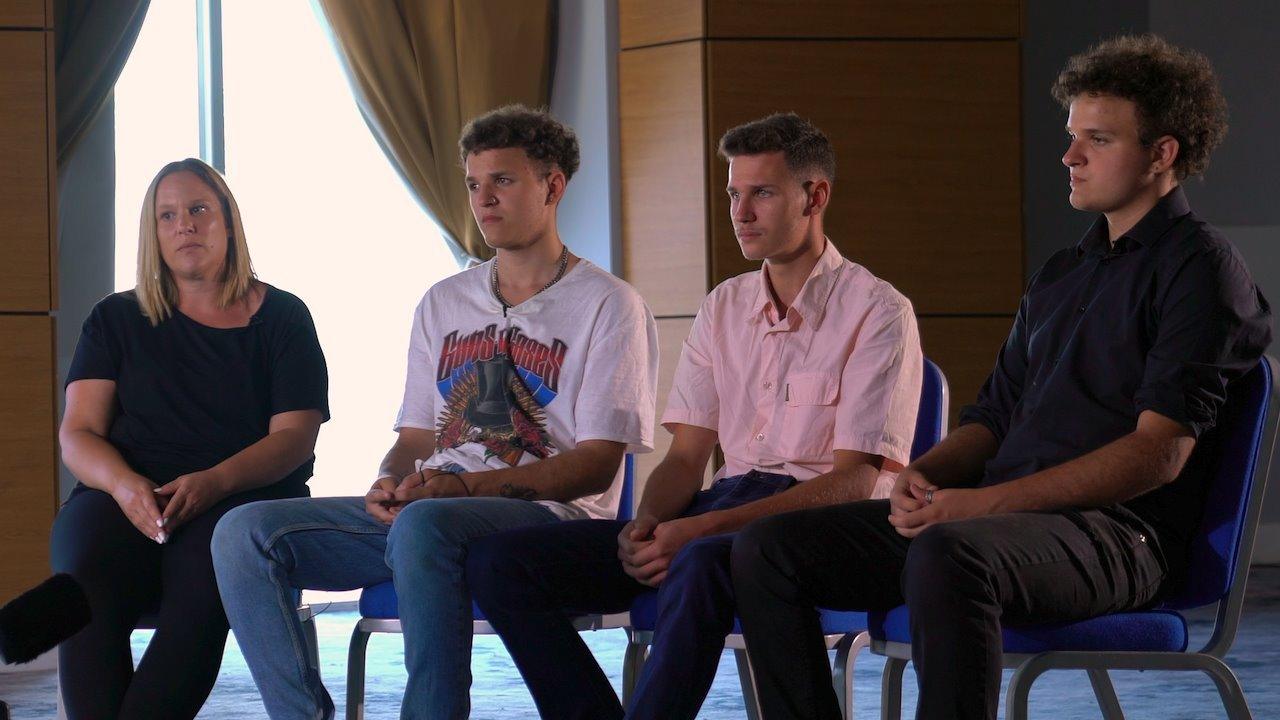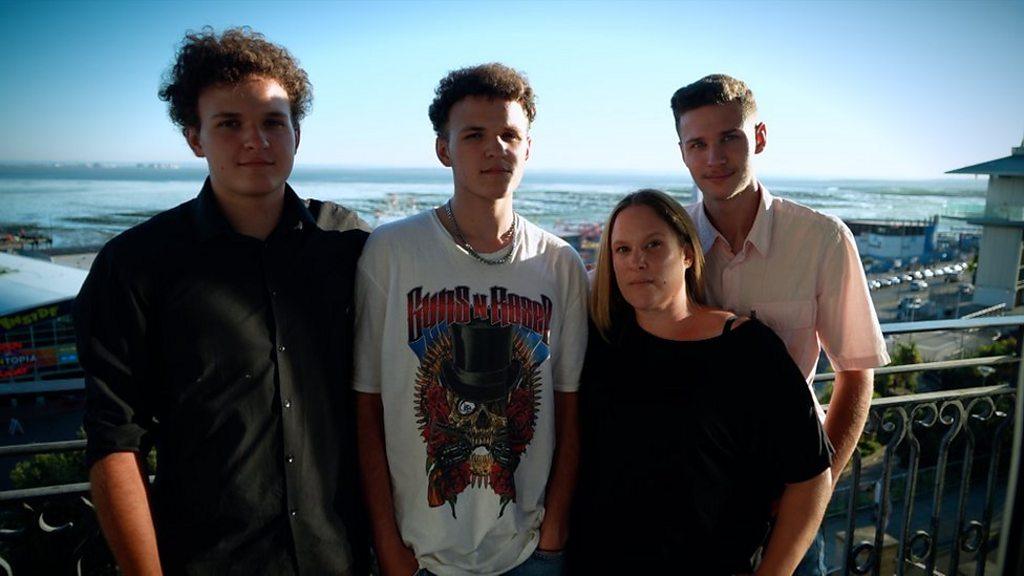Sarah Sands: ‘Mum killed our abuser - it didn’t stop the nightmares’
- Published
WATCH: Sons of Sarah Sands, who killed their abuser, speak about the crime for the first time
Eight years ago, Sarah Sands stabbed a convicted paedophile to death. Speaking together for the first time, her three sons tell BBC News they were all sexually abused by him, and how they feel now about their mother's crime.
On an autumn night in 2014, Sarah Sands left her east London maisonette with a hood pulled over her head, armed with a knife. She walked to a neighbouring block of flats, to the home of an elderly man. Once there, she stabbed Michael Pleasted eight times, in what was later described as a "determined and sustained attack". He bled to death.
Pleasted was 77 and a convicted paedophile. At the time, he was facing further charges. He was accused of sexual offences against young boys on the estate, in Silvertown, where he lived. Legally, as in all such cases, the names of those boys could not be made public during the trial.
BBC News can now report, for the first time, that all three boys involved in the case were the sons of Pleasted's killer, Sarah Sands.
Her eldest, Bradley, who was 12 at the time, waived his right to anonymity last year to reveal the abuse. And in an interview with BBC News, his younger twin brothers - Alfie and Reece - have now done the same. They were 11 when their mother killed the man accused of abusing them.
As young adults - now aged 19 and 20 - they remember when, as children, they learned what their mother had done. Speaking alongside their mother, they say growing up with her in prison was hard. And while their mum says she has remorse about what she did, her sons are brutally honest about her actions.

The mum who stabbed to death a convicted paedophile, after he abused her three sons.
Watch now on BBC iPlayer (UK only)

"I thought hats off," Bradley tells the BBC. "I'm not going to deny it."
"It did make us feel safer," Alfie adds. "It didn't slow down the nightmares. But it did give us a sense of security because you didn't have to walk down the street thinking he was going to come around the corner."
"He lived literally across the road from us," Bradley adds. "I could open that window over there," he says pointing, "and I'd see his house."
Reece says, then aged 11, it was "nice knowing that he was dead". But he adds: "It didn't stop any afterthoughts, you know, we would often wake up crying [saying] 'where's mum?'"

Sarah Sands was captured on CCTV leaving Michael Pleasted's flat after the attack
Sarah Sands and her family moved to their new home, also in Silvertown, months before the killing.
She became friends with Pleasted, who lived on his own. He was a high-profile character on the estate, often perched on a seat outside the newsagents, giving him contact with the local residents and their children. "I thought he was a lovely old man," she says now. "I cooked for him, looked after him, always kept him company when I had the time."
Pleasted sorted the newspapers in the shop and some children had Saturday jobs working with him. "He asked if Brad could help out and he was so excited," Sands says. She says Pleasted was grooming her eldest son and gradually gaining more access to the twins. He invited the three boys back to his home.
One evening the twins disclosed to her that, while at the flat, Pleasted had sexually assaulted them. A week later Bradley revealed the same. Pleasted was arrested and charged with offences against her sons.
While he was awaiting trial, the judge gave him bail and said he could return to the estate. Sands said she was distraught and uncomprehending. She moved her family to her mother's small home.
'The whole world froze'
On the night of the attack, she was caught on CCTV going to Pleasted's flat. She says she wanted to ask him to plead guilty to the charges and spare her boys the ordeal of going to court.
"I didn't know what I was doing there," she says. "I realised I had made a huge mistake. He was not remorseful in any shape or form. He said 'your children are lying'. The whole world froze. I had the knife in my left hand and I remember he tried to grab it." She maintains she did not intend to kill Pleasted.
A few hours later she handed herself in at a police station with her blood-stained knife and clothing. The judge in the trial later said he did not believe she had "rationally thought through what taking a knife might lead to" but added: "I am sure the possibility of its use was in her mind."
Sarah Sands was convicted of manslaughter, rather than murder, on the grounds she had lost control. She was jailed for three and a half years - but later saw the sentence increased to seven and a half years because it was ruled to be too lenient. Court of Appeal judges said she had done nothing to help Pleasted hadn't called the emergency services.
She spent nearly four years in prison. "I had taken the law into my own hands," she says now. "I've always been raised to take responsibility for my actions."

Michael Pleasted's criminal record spanned three decades up to the 1990s
While their single mother was behind bars, the three boys and their two younger brothers lived with their grandmother.
"There was loads of us all in one room. There was no privacy," Bradley tells the BBC. "My nan was talking to my mum on the phone in prison, asking her if I could go and play football, or go out with my mates. And often she would say 'no'."
Alfie says the three brothers did "miss out on stuff". They saw her once a month on their regular prison visits. "Sometimes you just want to tell your Mum a problem," he says now. Their friends knew what had happened. But Bradley says he does remember other people asking: "Where's your Mum? We never see her."
"They were angry with me," Sands adds. "Before I went in, we were so close and then all of a sudden, I wasn't there anymore. It was awful for them."
Asked if she felt remorse for ending Michael Pleasted's life, she says: "Absolutely." Pressed further, she adds: "I bring life into the world. It never occurred to me that I would be guilty of taking life out of the world."
Name changes
During the court case it emerged that Pleasted had changed his name from Robin Moult and was a convicted paedophile. He had 24 previous convictions for sex offending spanning three decades. His crimes had carried jail terms. But nobody in the area, including the local council that housed him, knew about his past.
Sarah Sands has now joined others who are campaigning for tighter restrictions on sex offenders who change their names.
Labour MP, Sarah Champion, who has raised the issue with ministers, says some sex offenders are using their new identities to get through DBS checks. These are compulsory in certain roles and reveal criminal convictions.
"Once they have changed their names, they are able to get a new driving licence and passport in that name," says Sarah Champion. "That enables them to get a new DBS check. And we are finding that these people are then going into schools and other places where there are children and vulnerable people and exploiting their positions of trust in the most horrific ways."
The easiest solution would be for police to mark offenders' passports and driving licences at the point of sentencing, Ms Champion tells BBC Radio 4's Today programme.
That would mean police would be automatically notified if an offender tried to change their name - and a new assessment could be made of their risk to society, she adds.
A Home Office spokesperson said it had already conducted a review of the issue, but it could not publish it because it contained sensitive information, which could potentially be used by offenders to exploit the system.
It said the UK had some of the toughest powers in the world to deal with sex offenders living in the community.

Sarah Sands with her sons (from left to right) Reece, Bradley and Alfie
Sarah Sands was released from prison in 2018. Her sons say they have managed to rebuild their relationship with her since then. "She did try to baby us," says Reece, smiling. "It was nice but it just makes you realise all those years that were lost."
"There is nothing that is going to break the family bond," adds Bradley.
The boys say, as children, they regretted revealing the abuse. "If we had all kept out mouth shut, we would have had our mum, and we would have been going shopping, going to the cinema, doing what a normal 12-year-old would do," says Bradley.
But they say they now realise it is important for victims to speak out. "It going to be hard, but it does get better," says Reece. "You should always come forward," Alfie adds, "it's better to talk. If you don't, it's just going to get worse."
If you've been affected by issues raised in this video, there is information and support available on BBC Action Line
- Published23 November 2022
